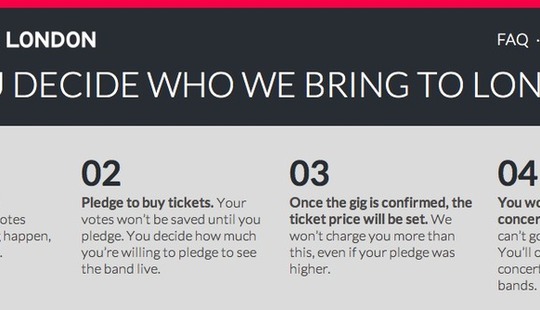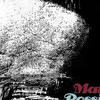Yesterday, tickets went on sale for a gig that was made possible by the DiS community. We had patiently waited a decade since the release of Read Music/Speak Spanish for Desaparecidos to venture over to the UK and sizzle our hearts and minds. Seeing shows announced in the US doesn't help any fans patience, and if you've ever ventured onto the DiS boards, you can imagine the grumbled frustration that ends up being posted.
When Ian Hogarth, co-founder of Songkick, mentioned Detour, and his plan to trial doing it as a way to bring acts to London, I jumped at the opportunity to get involved. After he explained what DetourLondon was, it made a lot of sense, especially if there was even half a chance that this trial might mean I can finally see 'Mall of America' live and hear Conor Oberst in the flesh singing: "They say it's murder on your folk career / To make a rock record with the disappeared!" I had a hunch a few folks on the DiS music forum might like the sound of that happening too.
I love the idea of Detour, primarily because it puts the power back in the hands (and pockets) of music fans. It seems to me like the first time crowd-funding has made sense, and it could just be the way all gigs will be booked in the distant future. I asked Ian from Songkick a few questions about Detour, but feel free to ask some follow-ups below this if anything doesn't make sense, and someone from Songkick, perhaps Ian himself, will respond to your queries...
---
DiS: You've already had some success with Detour, booking dates for Hot Chip and Andrew Bird... could you sum up in your own words what Detour is and how the idea came to be?
Ian Hogarth: I think at the heart it goes back to growing up in London, and being obsessed with live music. My friends and I were really into a lot of underground US hip hop back then and we'd always wait so long for the artists to finally come over. I'd spend all this time on MySpace and see hundreds of comments from fans asking artists to come to their city. I think we've just always had this instinct that real fans would do more than just leave a comment, they'd step up and pledge money to say to the band – If you come to my city, I’m in. The more I've learned about how the live music industry works, the more I see how that action on the part of the fan can be revolutionary for artists and promoters. We've seen that it can lead to things like Hot Chip playing in Folkestone, or Andrew Bird in Florianopolis. It is democratising the concert industry for artists and fans.
The web has obviously done a lot to liberate fans and artists, but it seems that not a lot has truly changed. In recent years, fan-funding has made a lot of things possible, but in music it's stills seems more like glorified pre-ordering of albums by a fan-club, rather than a 'new model'. How do you think events differ from artefacts, as the live industry has to some extents still been thriving...?
I think the central reason that fan-funding has yet to impact music in a truly fundamental way may be that musical artists are actually more risk averse and concerned about managing hype than their peers in other creative industries like film, literature or video games. You can kind of see that based on the levels of activity across the various verticals on Kickstarter. I think the issue is that the historical model where financial risk is carried by labels (advances) and promoters (guarantees) has lead to only very confident, or emerging artists to experiment with these new models. The really exciting thing for me though is that we're seeing an entire wave of new acts coming up who are more comfortable with the dynamic of trusting your fans to catch you if you leap. Artists who have been held back by the current systems and trust their fans over the legacy models.
The other thing that is kind of amazing about live events, is that the quality of the end product (how great the show is) is not just determined by the artist, it's determined by the fans, the promoter and the venue. That means that new models like Detour can not just be beneficial to the economics of concerts (cheaper shows for fans, higher profits for artists, more shows happening), but can actually improve the quality and atmosphere of the gig. That's the thing that has really blown me away about the Detour gigs I've been to, the atmosphere is really special. And unlike any previous crowdfunding initiatives, the crowd that funds the event online, then becomes the crowd offline sharing something completely unique. I think if you look at some of the greatest live acts of all time, they've kind of hacked this sort of shared collaboration e.g. the way the Grateful Dead handled ticketing. The thing that motivates me is the idea of giving that kind of control to many more fans and artists.

The music business is always reluctant to change: What have been the biggest obstacles to over come? Aside from music fans, who else has been most supportive of the idea thus far?
It's been a real learning experience trying to get Detour off the ground. The people who have been most supportive have been artist managers and promoters. The managers have already seen the power of networked technology to help their artist's careers having seen iTunes, YouTube, Soundcloud etc, and many of the new managers are extremely tech savvy. When they learn what we're trying to do with Detour, they have almost universally got very excited. Independent promoters have also seen this as a system for creating shows that would be very helpful to their business. They currently operate on razor thin margins where one bad show can wipe out the profits of 9 successful shows. They see Detour as a way to focus on creating amazing event experiences for a wider range of artists, with less risk. The only parties that have been somewhat resistant to Detour have been agents. While there have been some amazing agents who have really embraced the concept and helped us to experiment, there have been others who are very skeptical or suspicious about technology applied to the live business. To be fair though, this is an industry that has looked roughly the same for 20 years, so we are also patient and focused on really explaining what we're doing here and how it will help their artists.
Obviously Songkick has a lot of data on artists, fans and general geographical stuff, to what extent will the data drive Detour or is it hard to tell because a lot of problem this is solving due to blackholes and grey areas?
That's a great question. My background is basically a mix of music and technology. I studied big data stuff at uni, and for a while was super convinced of the power of data. I think the more I understand about the power of networks the more I believe that while data can be a powerful amplifier, the real power of Detour is handing control over to true fans. I'll give you a couple of examples of the stuff that has got me the most excited. With the Hot Chip Detour a couple of hardcore fans in Folkestone decided that they were going to make it happen in their town. They got super proactive and started to email all their friends and even petitioned the local radio station and newspaper. It exploded and went completely viral in a matter of hours through word of mouth. That wasn't a story of big data, that was a story of self-organisation and the dedication of a few true fans. Similarly the coolest thing that happened with the Andrew Bird Detour in Latin America was that a small town in Southern Brazil beat out cities 10 times larger than themselves to make a show happen. I guess at heart what I'm saying is that big data reduces fans down to a data point, where as the real power of Detour is that a few truly dedicated fans can now make all the difference. I'm mean you're doing that with Desaparecidos.
For more about Detour and the Desaparecidos London gig, visit the SongKick blog.






















